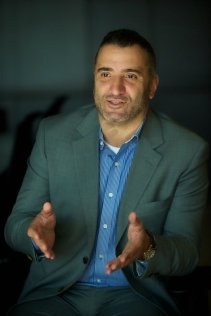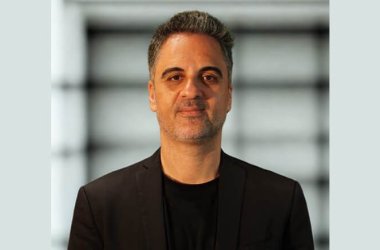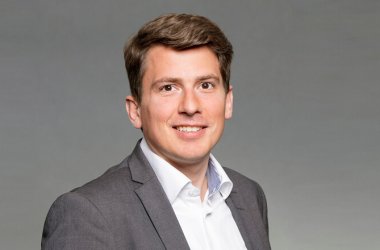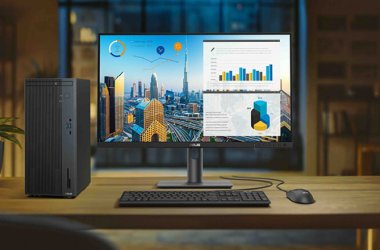CNME Editor Mark Forker spoke to Lyes Yahiaoui, CEO at Enviroserve, a global leader in electronics recycling, to find out more about the key role they are playing in terms of helping the UAE meet its sustainability targets, the efforts being made by the IT industry to reduce its carbon footprint – and how the UAE needs to introduce new legislation that encourages greater sustainability across the board.

In a candid interview, the charismatic CEO of Enviroserve began our conversation by highlighting how the company had evolved since its inception in 2004 – and highlighted how the explosion in the availability and affordability of smartphones globally moved them towards e-waste management.
“We started off as a refrigerant gas reclamation service tasked with the responsibility of capturing all refrigerant gases, which is a very hazardous gas that damages the Ozone layer. However, we then evolved the business model of the company to focus on specialised waste, which is essentially expiry waste that is required to be treated 100% environmentally. We then branched out into the growing e-waste segment of the market and established a phone processing facility, which was primarily borne out of the fact that the recycling and waste management industry had become completely overwhelmed by the proliferation in the adoption of smartphones”, said Yahiaoui.
Yahiaoui pointed out that the latest smartphones on the market had a much shorter lifecycle than that of their predecessors, which inevitably led to a larger quantity of e-waste, but he also illustrated that due to the ‘connected’ nature of the world we now live in and the central role devices play in it, on an individual level our carbon footprint has grown ten-fold.
“There has also been a huge rise in the development of electronic equipment and devices over the last 10 years, and we live in a digital economy that is fueled by technology. As a result of this shift as we became a society more dependent on technology, we jumped from 2KG per-person to 17KG in terms of our annual consumption. Now, that is just the average, in some more technologically prolific countries that figure could be 29KG per-person. Everybody has a tablet, laptop and a smartphone device and most households have 2-3 TV’s, and when you factor in chargers and other appliances required for a particular device you can see how e-waste on a global scale has skyrocketed”, said Yahiaoui.
There is a lot of complexity involved when it comes to the process of recycling products like tablets, smartphones, dishwashers and other electronic appliances, and the dynamic CEO of the global recycling leader explained the different nuances involved and how they effectively breakdown and recycle a particular product.
“Any product that comes into an Enviroserve processing facility will be recycled to a rate of 96-98%. In terms of the process used to recycle the products we use state-of-the-art German and Swiss engineering, and the plant is made up of multiple modules that perform different tasks. We take the contamination out of the products and then we crush the products’ and this is performed by machines, depending on the product will be the removal of magnets. We use air flow to separate the plastic from the metal – and once we separate the plastic and the metal, we then start separating the different metals such as aluminium, copper, and steel”, said Yahiaoui.
The critical importance of the job carried out by Enviroserve cannot be understated, especially when you consider the very real and present issue of climate change that we face on a global scale, but whilst it is honourable profession, how do they make money?
“Well, it’s certainly not an overly costly process, but it’s not free either. It is like any other waste, whether it be industrial waste, food waste, or hazardous waste, treatment has a cost. We use complex technology, and our facility is built to handle e-waste at scale. Every product we have is recycled and treated into different raw materials. We call these raw materials commodities, and we sell them to producers from the automotive industry who need these materials, and the pellet industry, who develop pellets out of plastic, so every commodity has a market, because raw materials can be used in a wide variety of industries”, said Yahiaoui.
Over the last number of years, largely due to the concerted global movement towards a more sustainable world, evidenced by the Paris Climate Accord, more and more companies are placing a greater responsibility upon themselves to reduce their carbon footprint, especially in the energy-intensive world of IT and technology.
However, as Yahiaoui stressed those companies are very much of a ‘developmental stage’.
“It has become evident that a number of the multinationals are trying to set the trend in terms of making environmental protection and sustainability a core part of their business. I would say they are still very much in the development phase in terms of their sustainability initiatives. But it certainly has become a major focus for many tech companies, and companies like Lenovo and HPE are really building business models around the topic of sustainability”, said Yahiaoui.
Interestingly, he pointed out that whilst it is all well and good that large tech and IT manufacturing multinationals are getting their house in order in terms of sustainability, SMEs that deal directly in repairing laptops and machines have not subscribed to the sustainability and environmental protection agenda.
“SMEs that are dealing with fixing laptops and machines actually generate more e-waste than any of the larger companies, but unfortunately they are not part of the CSR environmentally friendly and sustainability initiatives that are being spearheaded by others in the IT industry. They are more commercially orientated. They harvest their equipment and re-sell it to traders, and once harvested by those traders, 90% of the product which is plastic will be thrown in the landfill, so that is actually a major issue that needs to be addressed”, said Yahiaoui.
The CEO of Enviroseve reserved praise for the UAE leadership in terms of how they have tackled the issue of sustainability head on – and for creating an environment that fosters an ecosystem committed to making the UAE a more eco-friendly and safer place for all, but he said there is plenty of room for improvement.
“In the e-waste industry you need to be supported by the legislators and lawmakers in the country. There are many laws in the UAE that are very proactive and progressive in terms of sustainability, but there is still a lot to be done in relation to e-waste. We need to adopt an approach that is geared towards more treatment than landfill, and these models have already been introduced in Europe and the United States. We need more treatment, repurposing and recycling here in the UAE, so whilst the country has been very innovative in terms of pursuing sustainability initiatives, we can still do much, much better and individually take more responsibility in terms of our attitudes to recycling”, said Yahiaoui.





